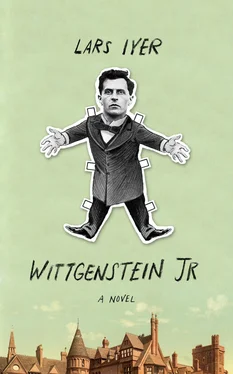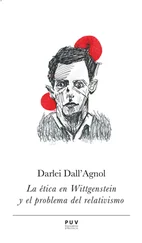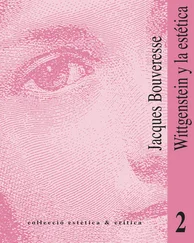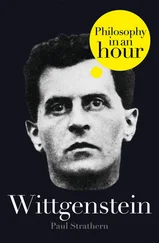Wittgenstein, diagnosed with cancer. Wittgenstein, dying. Wittgenstein, speaking his last words (Guthrie, in swan-song brilliance).
Sixth song: ‘A Wonderful Life.’ As moving as Susan Boyle singing ‘I Dreamed a Dream.’ As Paul Potts doing ‘Nessun Dorma.’
Tell them I had a wonderful life!
Tell them it was worth the strife!
Laughter, from Guthrie’s fans. Even Wittgenstein smiles.
After philosophy , lightness will be the highest virtue, Wittgenstein says. Blitheness will be sought after above all things.
Divination : that’s what he sees in our idiocy, he says. Prophecy . We are fragments of the future.
When the end of philosophy comes, we will weep, without knowing why we weep, he says. We will laugh, without knowing why we laugh. And as we weep, we will laugh. And as we laugh, we will weep …
Mulberry and Doyle are modelling their relationship on George Michael and Kenny — free to fuck whoever they want; free to surf Grindr and cruise.
But Doyle’s heart is not in it, he says — he just isn’t promiscuous. Besides, he’s too busy with the theatre. There are other things in life besides sex. But Mulberry …
DOYLE (rolling his eyes): Well, you know what he’s like.
Last night, Mulberry smoked crack on the roof of his house, Doyle says. Up on the roof, the ridge tiles between his thighs, laughing like a maniac, he declaimed a poem about a coffin full of shit … Mulberry’s obsessed with death, Doyle says. Even his laughter is tinged with death; even his laughing mouth is a pit of death …
Nihilism : that’s Mulberry’s disease, Doyle says. A sense that nothing’s really worth the candle. That the meaning of the world is vanishing. That all that is left are parodies of parodies of parodies. The blackest of black laughter. A laughter that laughs at itself, and laughs at itself laughing … That all his laughter is laughter before a mirror …
I’ve been possessed , Mulberry told Doyle last night. I am legion. There’s a horde of demons inside me, mocking me , he said. Laughing at me .
Doyle reminded Mulberry of Wittgenstein’s words. We must not think about our thinking. We must not philosophise about philosophy. To know our dividedness, to state it, is to be divided yet further . And when Mulberry climbed onto the roof, Doyle shouted up to him that we must not laugh at our laughter. But Mulberry was too high to hear.
E-mails from the Careers Service. Posters and flyers everywhere, advertising the employers’ fair. Recruitment agents, from the big City banks, from consultancies and law firms.
Brochures in our pigeonholes: Your future starts now (image: graduates throwing mortar boards in the air). The career of your life starts here (besuited trainees laughing with other trainees). What if the next big thing is you? (Godzilla-like graduate striding about). Individuality rocks (long-haired graduate playing a Flying V guitar). Be more than just your job (graduate sledding in the Arctic behind a team of huskies). Grow further (graduates in snorkels and flippers, exploring a coral reef). Scale new heights (free-climbing graduate, halfway up a cliff). Apply if you want to go faster (graduates on a down-plunging roller coaster). Think big (graduates in crampons crossing a ravine). Are you extreme? (parascending graduate, soaring into the sky). We’ll take you further than you imagine (graduates slashing their way through the jungle).
We pass the time before class, translating the brochures. Never manage to launch (graduate back in childhood bedroom). Earn nothing like the living wage (graduate eating discount sandwich from Boots ) . Never settle anywhere or at anything (graduate with backpack, trudging city streets). Join the intern nation (graduate at the photocopier) …
The failure to launch. To leave your house. To leave your room. To leave your bed. To open your eyes in the morning. How easily it could happen! One mistimed bout of depression and that would be it — the rest of your life, in your parents’ house, on soul-rotting medication.
We are nymphs, yet to shed our bodies. Yet to ascend fine-winged into life. But how easy it would be to slip and fall. How easy, to end up half-employed, underemployed, unemployed …
We feel as though the future were rummaging through us. Who knows what the future will find?
Wittgenstein, mystical today.
The kairos is coming, he says. The end is coming.
Time is gathered into itself like a wolf poised to leap upon its prey , he quotes.
He speaks of a new vocation of philosophy. A re vocation of philosophy.
He speaks of philosophy practised without philosophy. Philosophy no longer subject to its own law.
He will have to reawaken philosophy, he says. He will have to conjure up all of its ghosts.
Philosophy must be reborn, he says. But without itself —without its substance.
He speaks of the time when we will have joyously forgotten philosophy. Forgotten what philosophy was for . A time when we will play with philosophy, like gods …
We will not recognise him, after the end of philosophy, he says. We will not recognise each other!
Everything we have known, we will have forgotten. And when we remember it again, it will be in a new way.
You will leave Babylon with joy , he quotes. You will be let out of the city in peace .
After philosophy , no one will read, Wittgenstein says. And no one will stop reading. It will be impossible to distinguish reading from looking, from glancing, from letting your eyes rest on one sight or another.
After philosophy , no one will write, he says. And no one will stop writing. The merest gesture will be a kind of writing. A cough. A hairstyle. The flight of birds: all writing.
And after philosophy , there will be no more teaching, only learning, he says. No more studying, only encountering. No more classrooms, only walks along the Backs …
Walking home. Okulu ahead of us on the path, massive headphones over his ears. Faint strains of Mozart. A one-man protest against Cambridge superficiality .
We disappoint Okulu, we know that. He wants something from us. Seriousness. Depth . He wants to discuss ideas. But we let him down.
Okulu is like a reverse missionary , we agree. Like one of those Anglican priests, come from former colonies to reevangelise us. Only it’s not religion Okulu brings, but culture —old culture, high culture. Okulu is a high priest of old culture …
Okulu is a man of taste. Of cultivation. And Okulu knows things — about current affairs, about the latest philosophical and scientific theories. But about the past , too. He’s been seen in the library, with piles of old hardbacks …
But who needs libraries? Who needs books? We have them on our e-readers. Or rather, we could have them. We could have anything at all. Everything from the past can be called up in the present. Everything can be here — everything that was ever thought, or written, or composed, or painted. We can commune with all the ghosts. We can wake up the dead. But who wants to wake up the dead?
Library hardbacks should stay closed, their secrets hidden. Their spines should stay turned to us on their shelves. Keep them asleep. We won’t disturb them. They’re not for us, after all. They were not written with us in mind .
And they reek of the past. Their pages have the musty smell of the past. The smell of old forgotten things. Of things that should be forgotten. Sun-browned pages. Date-stamps from decades ago. Annotations in a tiny hand. Underlinings. Whole passages marked in yellow highlighter. Tan-brown stains from coffee and tea. Evidence of squashed insects. Dried-up tear splashes. Curly strands of pubic hair. Traces of wiped blood. Mementos: an old train ticket, a cinema ticket … Old things! Old things!
Читать дальше












